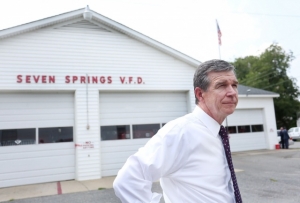Cooper tours Seven Springs disaster buyout sites
By Steve Herring
Published in News on August 15, 2018 5:50 AM

News-Argus/CASEY MOZINGO
Governor Roy Cooper tours Main Street Tuesday as he walks around to get a look at restoration efforts and flood damage that remains following Hurricane Matthew almost two years ago.

News-Argus/CASEY MOZINGO
Governor Roy Cooper stands in front of of the old Seven Springs Volunteer Fire Department during his walking tour of the town Tuesday. The department, flooding during Hurricane Matthew, is being moved to higher ground. A groundbreaking is scheduled for Friday.
SEVEN SPRINGS -- Standing in the shade of a flood-ravaged building that was once home to a bank, Carolyn Griffin was determined to have her photo taken with Gov. Roy Cooper.
Cooper posed with Griffin, who likes to tell people that she is one of the oldest residents in the riverside village. He then posed with Griffin and her two daughters.
Cooper was in town Tuesday morning to survey the lingering damage caused by catastrophic flooding from the Neuse River caused by Hurricane Matthew in October 2016.
He also toured some of the 15 properties that are part of the federal buyout program.
"I wanted to come and see the properties that you have scheduled to be bought out here, and tell me a little bit about what is going on," Copper said.
There is a lot of rental property in town not eligible for the buyout, Mayor Stephen Potter said. A couple of those properties were sold, and one is inhabited again, he said.
The buyout is important for resiliency in order to keep the problem from reoccurring, Cooper said.
Once the structures are removed, the sites will be left open as green space in perpetuity and cannot be built upon, he said.
"I think they are making good choices to make sure some of these properties are bought out that are flood prone," Cooper said.
Cooper took a brief walking tour of the village as state Emergency Management officials pointed out some of the properties approved for the buyout.
The walk took him past the fire station Hurricane Matthew flooded and a new one on higher ground on nearby N.C. 55 will soon replace it.
It also took him past the old town hall empty since Hurricane Floyd inundated the village in 1999.
More than $730 million has been put out statewide so far for disaster recovery, but much more work remains to be done, Cooper said.
Cooper also used the stop to once again encourage flood victims to apply for disaster assistance.
The governor asked Griffin how the floodwaters affected her and whether she applied for any of the disaster assistance programs.
Griffin, whose home flooded, said she applied for three different programs, the most recent just a few weeks ago through the Community Development Block Grant-Disaster Recovery program.
She said she was glad to see the governor.
"He checked to make sure that I had registered with everybody," Griffin said.
The town has about 55 to 60 residents, down from a pre-flood population of 115, Potter said.
"I think there is a real will to continue at least for some people living in Seven Springs," Cooper said. "Because of the frequent flooding Seven Springs has experienced, there are just some people who do not think they can live here anymore and have moved to other places and are going to take the buyout.
"But clearly the mayor and other people want to continue with the development here, and I think it would be important for that to happen that funding to be provided for that to occur particularly if it is in an area they believe can be protected from future floods."
Cooper asked Potter if residents affected by the flood had applied for disaster assistance.
Potter said that was difficult to answer since the town has lost track of so many who have moved away.
"We are trying to get people to apply for (a Community Development Block Grant)," Cooper said."We are waiting on that environmental review. Once that is done, we can really be moving."
Six block grant intake centers are open, including one in Goldsboro located in the former Farm Service Agency Building, 209 W. Spruce St. It is open from 9 a.m. to 5 p.m. Monday through Friday. Call 2-1-1 to make an appointment.
It has been nearly two years since Hurricane Matthew left most of the town under several feet of water, and for Griffin, Potter and others in the county's oldest town, Cooper's visit was a welcome sign they have not been forgotten and somebody knows where they are.
Griffin said people regularly ask her if Seven Springs is in Wayne or Duplin county.
"Politicians don't know where we are either," she said.
Cooper thanked Potter for his leadership and tenacity.
"Long-term recovery is a process," Cooper said. "But we want it to go as fast as it can."
Potter said he thinks one solution is to find a way to bring in more affordable housing to the area.
"Affordable housing is a problem that Hurricane Matthew has put a light on," Cooper said. "It was an issue before Hurricane Matthew."
Potter said he was proud Cooper had taken time out of his schedule to visit the village.
"There aren't that many of us and to have that kind of attention, it feels really good," Potter said. "It's the first governor we have seen here since 1999 in the village. Of course it (recovery) is a slow process.
"We appreciate everything that he and (N.C. Emergency Management) Director (Michael) Sprayberry have done to try to move this along. I think a lot of people have complained, but when you have a flood it has a huge impact on families."
However, if people compare the timeline and buyouts associated with previous disaster recoveries, they will see that it does not happen overnight, Potter said.
When Hurricane Floyd flooded the village in 1999, buyouts hadn't even started from a flood in 1996, he said.
"It took years for the buyouts after the '99 flood," Potter said. "We may even be a little ahead of pace of what traditionally and historically has happened."
Potter said he thinks the state has taken steps under Cooper's leadership to ease the situation and to come up with different plans, thinking outside the box, that has not been seen in the past.
The village continues to look for things to do for using the open space left by the buyouts such as a possible farmers market or recreational uses to take advantage of the Neuse River, Potter said.
Grants are available to help with that, he said.
"We have a lot to do, but we need the buyouts to happen first and then we can move from there," Potter said.
